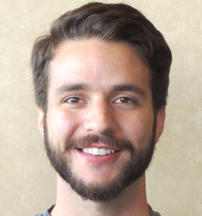
Nolan Trevino
Thesis Title:
Opioid-induced changes in nucleus accumbens shell
Current Position:
Recent Graduate
Undergraduate Institution and Major:
Texas A&M University Kingsville, B.S. in Biomedical Science, 2015
Graduate Advisor:
Mark Thomas, Ph.D., Department of Neuroscience
Graduate Research:
The propensity to seek out and abuse opioids during a period of abstinence is a main cause for opioid misuse. My graduate research focuses on the impact of opioid withdrawal on the excitability of medium spiny neurons in the nucleus accumbens - a key structure that mediates hedonic opioid reward. I'm interested in defining opioid withdrawal-induced changes in this area and how they contribute to drug-seeking behavior.
Graduate Honors/Awards:
- Medical School Graduate Fellowship
Research Categories
- Behavorial and Cognitive Neuroscience
- Neuroimaging and Optogenetics
- Neuroscience of Drug Abuse and Addiction
- Synaptic Plasticity and Learning
Rotations
Mark Thomas, Ph.D., Departments of Neuroscience and Psychology
Paul G. Mermelstein, Ph.D., Department of Neuroscience
A. David Redish, Ph.D., Department of Neuroscience
Gordon Smith, Ph.D., Department of Neuroscience
Undergraduate Awards:
Ronald E. McNair Baccalaureate Scholar
TAMUK Council for Undergraduate Research (TCUR) Award
Undergraduate or Post-Bac Research:
At Texas A&M University – Kingsville, I worked with Dr. Rudolf Bohm in a Neurogenetics laboratory that studies poly-glutamate (polyQ) expansion diseases within a subset of neurons that are responsible for dictating courtship behaviors in Drosophila melanogaster. My role in the lab was to utilize the diverse genetic toolkit of Drosophila to design constructs that allowed for inducible, doubly tissue-specific expression of transgenes. One of the aims of this lab is to determine the molecular mechanism of polyQ diseases and whether or not neuronal activity alters their pathogenesis.
What Got You Interested In Research?
Initially, I wanted to earn a Pharm.D and become a pharmacist. However, throughout my first year as an undergraduate, I realized that I am interested in the scientific ideas and experiments that contribute to our understanding of biology. This led me to volunteer as an undergraduate research assistant where I could actively apply the coursework to design experiments and gain knowledge, rather than recapitulate what is already known.
Why Did You Choose MN?
I was encouraged to apply to the University of Minnesota (UMN) by a trusted faculty mentor at my undergraduate institution. After some research, I learned that UMN had an extensive neuroscience graduate program with far more faculty members, and documented collaborations, than any program I had applied to at the time. This was a deciding factor for me because I am interested in approaching neuroscience research more eclectically than I have in past research laboratories.
There were many favorable experiences during the interview weekend that drew me into this graduate program. Ultimately, it was transparency of the entire program during the interview that solidified my choice. The faculty and students were completely honest about what to expect from the Graduate Program in Neuroscience, what the program does well, what it doesn’t, and how the program recruits student input to improve the program.
Student Mentor and the Best Advice They Gave:
Zachary Zeidler (great human): Zach provided me with an incredibly efficient and systematic way to choose rotations so that I may maximize my time as a rotating student.
Zach’s advice when I asked what to pack for Itasca: [pause] “Hmm. Clothes? What else did I bring…?”
